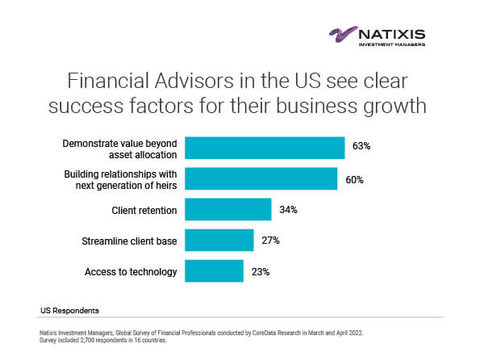- The stock market is predicted to finish the year in positive territory, depending on inflation
- Advisors think alternatives are more attractive in the current market. Two-thirds say that increasing fixed-income allocations is a challenge, mostly because investors don’t understand bonds.
- One in four advisors personally invests in cryptocurrencies1, but most think it’s kryptonite for clients. Six in ten are advising clients to avoid crypto, despite potential diversification benefits.
Financial advisors expect the markets to remain volatile in the second half of 2022, but they predict the S&P 5002 will ultimately post a gain of 4.4% for the year, according to new survey findings published today by Natixis Investment Managers (Natixis IM). Their outlook is decidedly bullish considering the staggering market losses year to date and a triple dose of reality for U.S. investors – a simultaneous double-digit correction in stock and bond prices and the biggest rise in inflation in four decades.
This press release features multimedia. View the full release here: https://www.businesswire.com/news/home/20220628005286/en/

Financial Advisors in the US see clear success factors for their business growth (Graphic: Business Wire)
Natixis IM surveyed 300 financial advisors in the U.S. as part of a global survey of 2,700 advisors across Asia, Europe, Latin America, North America, and the UK. The survey was conducted in March and April after the S&P 500 already had dipped 10% below 52-week highs before descending into bear market territory in June. U.S. advisors’ home market outlook is more pessimistic than that of advisors in ten of the 16 countries surveyed, especially Asia and Latin America. Overall, advisors globally expect the MSCI World Index3 to return 6.4% this year.
The biggest risks to U.S. advisors’ outlook are inflation (66%) and rising interest rates (61%), followed by geopolitical conflicts (46%), including the war in Ukraine. Relatively few (28%) are concerned about valuations now, and fewer still (9%) are worried about the risk of new Covid-19 variants.
Advisors are generally optimistic about the resilience of the U.S. markets and their ability to adapt to shifting market drivers. They are confident their clients can still realistically achieve 7% average annual growth above inflation over the long term; however, their return assumptions are 220 basis points lower than the 9.2% annual returns they believe their clients are expecting. For now, advisors are resetting investment strategies and helping clients understand new market realities.
The three questions advisors say they are hearing most from clients are:
- Should I get out of the market now? (88%)
- Should I be afraid of rising interest rates? (88%)
- Does my portfolio have inflation protection? (79%)
“Many investors are frightened as they see the value of their financial assets plummeting, yet rash investment decisions, such as liquidating assets, can further compound losses,” said Dave Goodsell, Executive Director of the Natixis Center for Investor Insight. “Financial advisors play a critical role in helping clients understand what broad market movements mean for their personal finances. They need investment strategies that can help clients still get to where they want to be financially, but they need to work to keep clients on track and not let their emotions get the best of them.”
When advisors were asked how their views on asset classes have changed or not, the survey found:
- 69% of advisors agree that rising rates and inflation have made commodities4 more appealing, their most bullish call followed by infrastructure investments (41%).
- They are two times more likely to say stocks have become more attractive (40%) now versus less attractive (21%).
- 59% consider alternative investments more attractive in the current environment.
- 72% of advisors think fixed income is less appealing now, an obvious reflection of their concern about the impact of rate increases on bond prices.
“The investment assumptions that have driven market performance over the past ten years – low rates, low inflation, and synchronous global growth – have shifted. While the transition has been turbulent, the extreme economic bearishness permeating consensus views is probably overdone,” said Jack Janasiewicz, Lead Portfolio Strategist at Natixis Investment Managers Solutions. “As rate increases are priced in and the inflation outlook improves, which we think it is, the market is likely to be more supportive of stocks and bonds as essential drivers of long-term growth.”
A reason to believe in bonds
While bond values have long been suppressed by low rates, yields are now rising in response to Federal Reserve actions. Yet financial advisors may need to work at convincing clients to add fixed income back into their portfolios. When asked about the top challenges to increasing fixed-income allocations, advisors said:
- Clients generally aren’t knowledgeable about the bond market (39%), the biggest hurdle advisors cited when recommending fixed income strategies.
- 36% say the benefits of bonds in portfolio construction aren’t obvious to most investors.
- An equal percentage (36%) say clients’ risk appetite gets in the way of using bonds.
Real estate remains an attractive inflation hedge
Rising rates seem to have had no detrimental effect on how financial advisors view real estate investments. While rising rates may make buying property more expensive, the asset class’s history of generating yields that outpace inflation makes real estate an appealing investment in times like these. The quest for yield is also evident in the appeal financial advisors are finding in alternatives.
When asked whether they consider real estate investments more or less attractive given rising rates and inflation, the survey found:
- 32% think residential real estate is more attractive now; 28% think it’s less attractive, and 40% say their views haven't changed.
- 34% think commercial real estate is more attractive; 27% think it’s less attractive, and 39% say their views haven’t changed.
Advisors see cryptocurrency as kryptonite for clients
Half of advisors (50%) say their clients are asking if they are missing out on investing in cryptocurrencies such as Bitcoin and Ethereum. Most (61%) are advising their clients to avoid investing in cryptocurrencies for now. Nearly as many (57%) are telling clients to stay away from non-fungible tokens (NFTs) as well. The cryptocurrency sector’s total market capitalization grew by 187.5% in 2021,5 but the run ended abruptly in the new year, and the sector is down more than 60%6 since January.
Still, at least some advisors may be warming up to the potential portfolio benefits they offer. The survey found:
- 33% of advisors think cryptocurrencies can provide some diversification benefits to clients’ portfolios.
- 26% of advisors personally own cryptocurrency investments, and most (53%) say they comfortable advising clients on them.
- 86% don’t offer clients access to cryptocurrency investments on their platform.
- 50% don’t think it’s appropriate for investors to have exposure to cryptocurrency.
The full global report on the findings of the Natixis Investment Managers 2022 survey of Financial Professionals can be found here.
Methodology
Natixis Investment Managers surveyed 300 financial advisors across the United States, as part of a larger global survey of 2,700 financial professionals in 16 countries. Data were gathered in March and April 2022 by the research firm CoreData with additional analysis conducted by the Natixis Center for Investor Insights.
About the Natixis Center for Investor Insight
The Natixis Center for Investor Insight is a global research initiative focused on the critical issues shaping today’s investment landscape. The Center examines sentiment and behavior, market outlooks and trends, and risk perceptions of institutional investors, financial professionals and individuals around the world. Our goal is to fuel a more substantive discussion of issues with a 360° view of markets and insightful analysis of investment trends.
About Natixis Investment Managers
Natixis Investment Managers’ multi-affiliate approach connects clients to the independent thinking and focused expertise of more than 20 active managers. Ranked among the world’s largest asset managers1 with more than $1.3 trillion assets under management2 (€1.2 trillion), Natixis Investment Managers delivers a diverse range of solutions across asset classes, styles, and vehicles, including innovative environmental, social, and governance (ESG) strategies and products dedicated to advancing sustainable finance. The firm partners with clients in order to understand their unique needs and provide insights and investment solutions tailored to their long-term goals.
Headquartered in Paris and Boston, Natixis Investment Managers is part of the Global Financial Services division of Groupe BPCE, the second-largest banking group in France through the Banque Populaire and Caisse d’Epargne retail networks. Natixis Investment Managers’ affiliated investment management firms include AEW; AlphaSimplex Group; DNCA Investments;3 Dorval Asset Management; Flexstone Partners; Gateway Investment Advisers; Harris Associates; Investors Mutual Limited; Loomis, Sayles & Company; Mirova; MV Credit; Naxicap Partners; Ossiam; Ostrum Asset Management; Seeyond; Seventure Partners; Thematics Asset Management; Vauban Infrastructure Partners; Vaughan Nelson Investment Management; and WCM Investment Management. Additionally, investment solutions are offered through Natixis Investment Managers Solutions and Natixis Advisors, LLC. Not all offerings are available in all jurisdictions. For additional information, please visit Natixis Investment Managers’ website at im.natixis.com | LinkedIn: linkedin.com/company/natixis-investment-managers.
Natixis Investment Managers’ distribution and service groups include Natixis Distribution, LLC, a limited purpose broker-dealer and the distributor of various U.S. registered investment companies for which advisory services are provided by affiliated firms of Natixis Investment Managers, Natixis Investment Managers S.A. (Luxembourg), Natixis Investment Managers International (France), and their affiliated distribution and service entities in Europe and Asia.
1 Cerulli Quantitative Update: Global Markets 2021 ranked Natixis Investment Managers as the 15th largest asset manager in the world based on assets under management as of December 31, 2020.
2 Assets under management (“AUM”) of current affiliated entities measured as of March 31, 2022 are $1,320.6 billion (€1,187.6 billion). AUM, as reported, may include notional assets, assets serviced, gross assets, assets of minority-owned affiliated entities and other types of non-regulatory AUM managed or serviced by firms affiliated with Natixis Investment Managers.
3 A brand of DNCA Finance.
This material is provided for informational purposes only and should not be construed as investment advice. There can be no assurance that developments will transpire as forecasted.
The data shown represents the opinion of those surveyed, and may change based on market and other conditions. It should not be construed as investment advice.
All investing involves risk, including the risk of loss. No investment strategy or risk management technique can guarantee return or eliminate risk in all market environments.
4801396.1.1
____________
1 Cryptocurrencies are subject to numerous market risks, they are speculative and volatile, can become illiquid at any time, and are for investors who can tolerate the full loss of their investment.
2 S&P 500® Index is a widely recognized measure of US stock market performance. It is an unmanaged index of 500 common stocks chosen for market size, liquidity, and industry group representation, among other factors. It also measures the performance of the large-cap segment of the US equities market.
3 The MSCI All Country World Index is a free float-adjusted market capitalization weighted index designed to provide a broad measure of equity-market performance throughout the world. The MSCI ACWI is comprised of stocks from 23 developed countries and 24 emerging markets.
4 Commodity-related investments, including derivatives, may be affected by a number of factors including commodity prices, world events, import controls, and economic conditions and therefore may involve substantial risk of loss.
5 https://www.weforum.org/agenda/2022/01/top-cryptocurrencies-performance-2021
6 S&P Cryptocurrency Broad Digital Market Index as of June 20, 2022; https://www.spglobal.com/spdji/en/indices/digital-assets/sp-cryptocurrency-broad-digital-market-index/#overview
View source version on businesswire.com: https://www.businesswire.com/news/home/20220628005286/en/
Contacts
Kelly Cameron
Tel: + 1 617-449-2543
Kelly.Cameron@natixis.com





